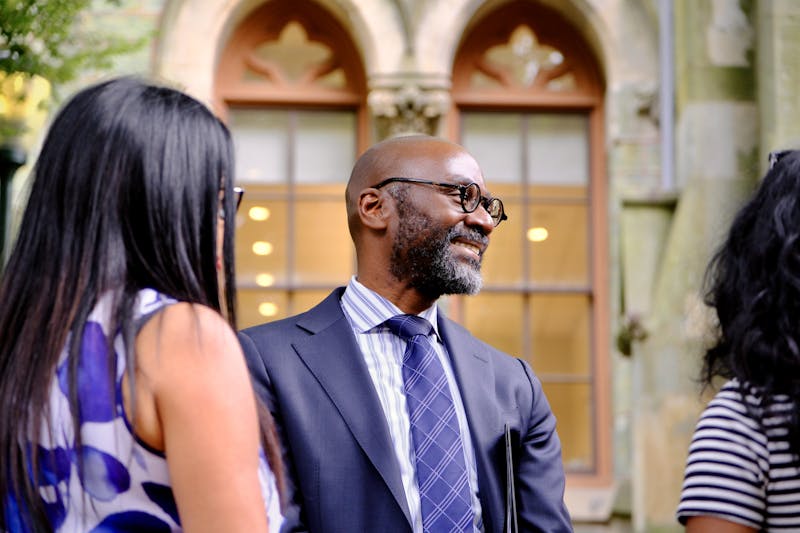She spoke to the Penn National Commission at the White Dog Cafe. Combining good food with stirring discussion, University President Judith Rodin spoke at a talk entitled "Celebrating the Conversation: Public Discourse and Democracy" last night at the White Dog Cafe. The evening focused on the goals of the Penn National Commission on Society, Culture and Community, a now 3-year-old panel formed by Rodin to examine and understand societal problems that impede democracy. Rodin explained that the PNC is a group of diverse individuals who "have committed a substantial amount of time and energy to thinking about the notion of civic engagement" and the importance of public discourse. Without open communication, such issues as abortion and racial and ethnic differences cannot be fully understood or surmounted democratically, she said. "Communities need discourse leaders and they need venues for discourse," Rodin said. "The White Dog gives us one opportunity in our community" to create such discourse. According to Rodin, the group believes that the polarization of political and social issues, the lack of strong public leadership, the fragmentation of communal life and the breakdown of public mores are the main impediments to public discourse and have created a climate of incivility. "The consequences [of incivility] are dangerous and widespread" Rodin emphasized. "There is increasing self-segregation and increasing intolerant behavior." The PNC is currently investigating ways to increase public discourse, including the development of a program to help public schools foster an environment of open discussion of important issues. Susan Furey, a public school teacher in the Philadelphia area, was very supportive of the group's ambitions, saying that "this is definitely needed in the schools." But she added that "in practice, it is difficult to unfold with this kind of approach because people are fearful of it." Hillary Aisenstein, a College senior and the chairperson of the Civic House steering committee, said she was happy with the talk. "[The PNC] is one of the programs that's helped put Dr. Rodin and Penn in a national limelight." The event was met with a group of protesters who claim to have been the victims of medical experimentation by Philadelphia city prisons, with the cooperation of the University, between 1951 and 1974. The group claims that Albert Kligman -- a Penn Dermatology professor emeritus who is credited with the discovery of the popular wrinkle- and acne-fighting cream Retin-A -- performed experiments on them and never told them about the consequences and that many of them now suffer from severe medical and psychological problems. The experiments were recently chronicled by Temple University Urban Studies Professor Allen Hornblum in his book Acres of Skin. Penn officials have offered the former prisoners free medical evaluations, even though they said they are not convinced that the ex-prisoners' ailments resulted fully from the prison tests. The prisoners have said that the offer doesn't go far enough, and protestors last night called the PNC event a "hypocrisy."
The Daily Pennsylvanian is an independent, student-run newspaper. Please consider making a donation to support the coverage that shapes the University. Your generosity ensures a future of strong journalism at Penn.
DonatePlease note All comments are eligible for publication in The Daily Pennsylvanian.







